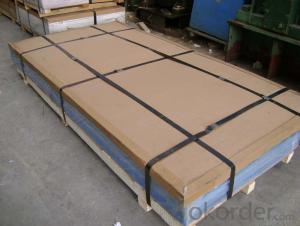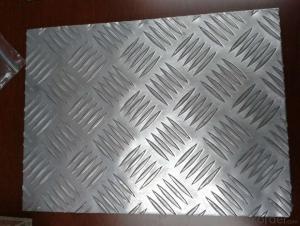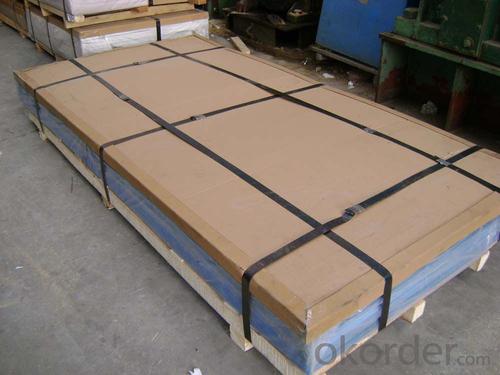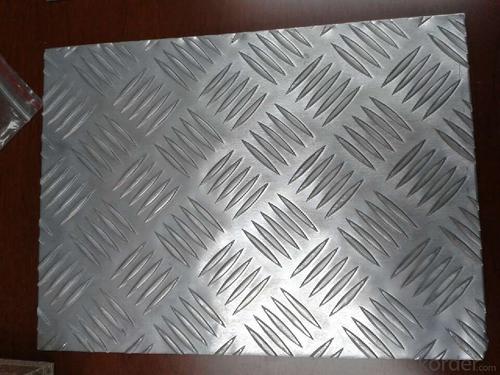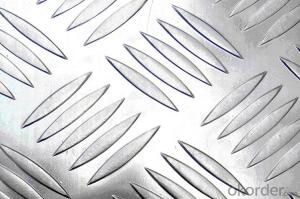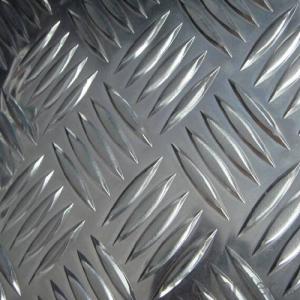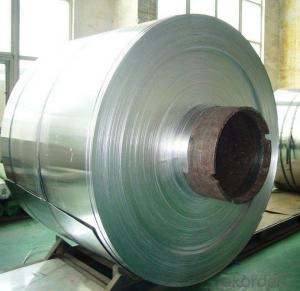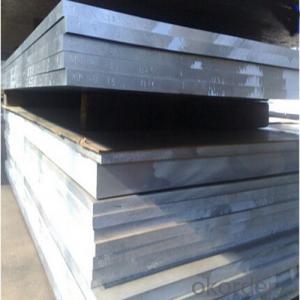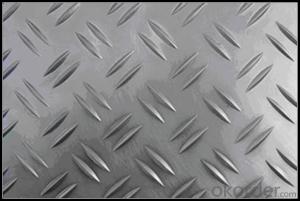3003 Aluminum Coil - Alu Trade Plate 3003 H14, Big, Small Five Bars
- Loading Port:
- China Main Port
- Payment Terms:
- TT OR LC
- Min Order Qty:
- -
- Supply Capability:
- -
OKorder Service Pledge
OKorder Financial Service
You Might Also Like
Aluminium alloys (or aluminum alloys;see spellingdifferences) are alloys in which aluminium(Al) is the predominant metal. The typical alloying elements are copper, magnesium,manganese,silicon,tin and zinc. There are twoprincipal classifications, namely casting alloys and wrought alloys, both of which are furthersubdivided into the categories heat-treatableand non-heat treatable. About 85% of aluminium is used for wrought products,for example rolled plate, foils and extrusions.Cast aluminium alloys yield cost-effective products due to the low meltingpoint, although they generally have lower tensilestrengths than wrought alloys. The most important cast aluminiumalloy system is Al–Si, where the high levels of silicon (4.0–13%)contribute to give good casting characteristics. Aluminium alloys are widelyused in engineering structures and components where light weight or corrosionresistance is required
Finishing: Mill Finish, Painted,One Side Bright, Brushed and Coil Anodizing available on request
Alloy: AA1050,1060, 1100, AA3003, 3005, 3015, 5052, 5754, 5083,8011, etc
Temper: H14/16/18/22/24/32,HO etc.
Thickness:0.2mm—100mm
Width:100mm—2300mm (Can be slitted)
Standard: GB/T 3880-2006 ASTM B-209
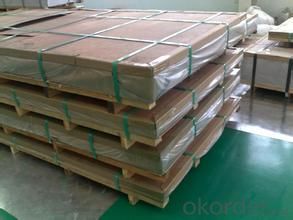
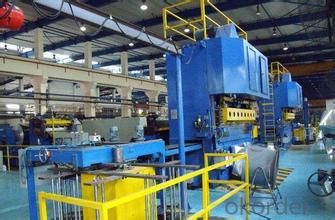
- Q: Why there is arc panel after aluminum coil straightening?
- The aluminum coil can only become flat and straight after being planished on stretch bender.
- Q: This question asks for a comparison between steel wires and other materials when used in coilings, highlighting the pros and cons of steel wires.
- <p>The advantages of using steel wires for coilings include high tensile strength, durability, and resistance to corrosion. Steel wires are also cost-effective and widely available. They offer excellent fatigue resistance, making them suitable for applications requiring repeated coiling and uncoiling. Disadvantages include higher weight compared to some alternatives, which can be a concern in certain applications. Steel wires can also be prone to rust if not properly treated, and they may not be as flexible as some other materials, potentially leading to difficulties in handling or installation. Additionally, steel's magnetic properties can be a disadvantage in environments where non-magnetic materials are required.</p>
- Q: What is the profit of aluminium coil gate?
- Market prices are almost transparent, the price can be said to earn a installation costs, two people installed, then, in addition to costs, profits of about 4 thousand and 500
- Q: The question asks if magnetic induction can be used to inspect the quality of an aluminum coil.
- <p>No, you cannot use magnetic induction to inspect the quality of an aluminum coil. Magnetic induction is a method used to detect flaws or discontinuities in ferromagnetic materials, such as steel, by inducing eddy currents. Aluminum is not a ferromagnetic material, so it does not retain magnetism or support the formation of eddy currents in the same way. Instead, other non-destructive testing methods like ultrasonic testing or radiographic testing may be more appropriate for inspecting the quality of aluminum coils.</p>
- Q: For an intake manifold on a car, as far as increasing the inlet air temperature which is better steel or aluminum? Assuming the cylinder heads are aluminum, and half the thickness of steel is used versus aluminum. I know that steel has a lower heat capacity than aluminum, so does this mean even in this case the steel will heat up quicker and disperse the heat into the inlet air more than aluminum? Basically which material will keep the inlet air as low as possible. I know certain plastics are better than both, but I'm just curious about these two metals. Thank you.
- Increasing heat temperature (Highest point) must be less than melting point of the Aluminum (1221 degree Fahrenheit).Now factor of the weight and stabilizing is important to choose the metal in that section .Aluminum is like fire cricket during melting and if be in flounce of the over heating my cause lot of damages .
- Q: How do aluminum coils contribute to the corrosion resistance of products?
- There are several ways in which aluminum coils contribute to the corrosion resistance of products. Firstly, aluminum itself is highly resistant to corrosion, thanks to the formation of a natural oxide layer when exposed to oxygen. This layer acts as a protective barrier, preventing further oxidation and corrosion. When aluminum is shaped into coils, it offers additional benefits for corrosion resistance. The coil form allows for a more even distribution of the material, ensuring that the entire surface area of the product is covered by the protective oxide layer. This helps to prevent localized corrosion and ensures a consistent level of corrosion resistance throughout the product. Furthermore, aluminum coils can be coated with various protective coatings or treatments to enhance their corrosion resistance even further. These coatings provide an extra layer of protection against environmental factors like moisture, chemicals, and UV radiation, which can speed up corrosion. Additionally, aluminum coils are often used in conjunction with other materials, such as galvanized steel or stainless steel, in products. These combinations, known as bimetallic or trimetallic products, utilize the different properties of each material to enhance corrosion resistance. For example, the aluminum layer can act as a sacrificial anode, corroding preferentially to protect the underlying material from corrosion. To summarize, aluminum coils contribute to the corrosion resistance of products through the inherent corrosion resistance of aluminum, the even distribution of the material in coil form, the possibility of applying protective coatings, and the use of bimetallic or trimetallic combinations. These factors ensure that products made with aluminum coils have a longer lifespan and are better protected against corrosion in various environments.
- Q: How are aluminum coils protected against corrosion?
- Aluminum coils are protected against corrosion through various methods such as applying protective coatings, anodizing the surface, using corrosion-resistant alloys, and implementing proper maintenance practices.
- Q: This question asks about the impact of aluminum coils on the quality of welding. It seeks to understand the relationship between the material properties of aluminum coils and the outcomes of the welding process.
- <p>Aluminum coils can significantly affect welding quality due to their unique properties. Aluminum has a high thermal conductivity, which requires more energy to weld, and can lead to rapid heat dissipation, affecting the weld's uniformity. Oxides on the aluminum surface can also interfere with the welding process, causing porosity and poor joint strength if not properly cleaned. Additionally, aluminum's low melting point can lead to distortion and warping if not managed correctly. The use of appropriate filler materials, proper cleaning, and precise control of welding parameters are crucial to achieve high-quality welds with aluminum coils.</p>
- Q: Can aluminum coils be used for electrical connectors?
- Yes, aluminum coils can be used for electrical connectors. Aluminum is a commonly used material for electrical connectors due to its excellent electrical conductivity, relatively low cost, and lightweight properties. It is widely used in various electrical applications, including power transmission and distribution systems, electrical motors, and transformers. However, it is important to ensure proper insulation and protection of the aluminum coils to prevent corrosion and ensure long-term reliability of the electrical connections.
- Q: Are aluminum coils suitable for decorative purposes?
- <p>Yes, aluminum coils can be used for decoration. They are lightweight, durable, and corrosion-resistant, making them ideal for various decorative applications. Aluminum coils can be shaped and colored to suit different design needs, often used in architectural features, interior design elements, and even in art installations. Their versatility and aesthetic appeal make them a popular choice for both commercial and residential decoration.</p>
Send your message to us
3003 Aluminum Coil - Alu Trade Plate 3003 H14, Big, Small Five Bars
- Loading Port:
- China Main Port
- Payment Terms:
- TT OR LC
- Min Order Qty:
- -
- Supply Capability:
- -
OKorder Service Pledge
OKorder Financial Service
Similar products
Hot products
Hot Searches
Related keywords
